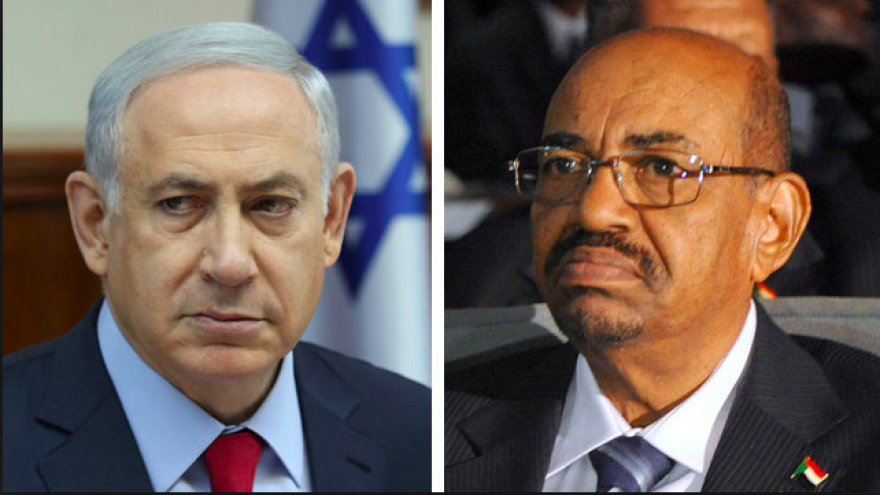Amid a flurry of reports that Israel is developing relations with Muslim countries in the Gulf and with Chad, the report that clandestine contact between Israel and Sudan had occurred seemed the least promising prospect of the lot.
“This is not the first time reports claimed that diplomatic relations between Sudan and Israel would be formally established,” Professor Yehudit Ronen, a leading expert on Sudan and the African Sahel region at Bar-Ilan University in Ramat Gan, told JNS. “Such claims have been reported many times in the past, but were never actualized.”
“This information is false and fabricated,” Bishara Juma, government spokesman and information minister, told reporters on Wednesday, according to Turkey’s Anadolu Agency.
“We have deep and ongoing political, ideological and religious disputes with Israel,” he said.
Axios reported on Wednesday that a representative from Israel’s Foreign Ministry held a secret meeting in Istanbul, Turkey, with Sudanese officials a year ago in order to renew dialogue between the two countries. The report claimed that then-intelligence chief Mohamed Atta, now the country’s ambassador to Washington, was at the meeting.
Wasil Ali, formerly the deputy editor in chief at the Sudan Tribune, tweeted on Thursday that the reported move could be an attempt by Sudan’s regime to remove itself from America’s list of state sponsors of terrorism, “thus opening door for debt relief & borrowing from international organizations.”
What is the convergence of interests, and why would Sudan make such a move?
Ronen said “it should not be forgotten that Sudan was the first Arab Muslim state that staunchly backed Egyptian President Anwar Sadat’s peace initiative with Israel and his 1977 visit to Jerusalem.”
At the time, Sudan’s government was led by President Gaafar Nimeiry, who praised Sadat’s peace moves, describing them as brave, related Ronen.
“Sudan has often clung to pragmatic positions, cautious not to adhere to emotional or nationalist ones,” she said, adding that “this attitude might be apparent in the consideration of establishing diplomatic relations with Israel today.”
Designated a state sponsor of terrorism
Sudan, which had previously been allied with Iran but had since cut off ties and shifted to the alliance of Sunni countries led by Saudi Arabia, had been hoping that move would bring it more international acceptance. Sudan is located just across the Red Sea from Saudi Arabia.
At the same time, Sudan was also a conduit for weapons transfers from Iran to Hamas in the Gaza Strip. In 2009, Israel purportedly carried out a series of airstrikes in Sudan targeting Iranian rocket shipments. Sudan also blamed Israel for additional airstrikes in 2011 and 2012.
In 2014, Sudanese authorities ordered the closure of Iranian cultural centers and expelled Iranian diplomats; local media reported that it was because of the spreading of Shia Islam in the mostly Sunni country. But economic need probably played a major role, with Saudi Arabia reportedly depositing $1 billion in the country’s central bank.
Sudan’s President Omar al-Bashir, who came to power in a military coup in 1989, was indicted by the International Criminal Court for allegedly committing war crimes in Darfur.
Several years later, the United States designated Sudan as a state sponsor of terrorism in 1993 for its links with international terror groups.
In urgent need of foreign investment
Sudan is suffering from a serious and chronic economic crisis, and is in need of urgent foreign investment and aid from the West in order to resuscitate its development projects and boost its flailing economy.
“Possibly, Sudan’s regime hopes that by approaching Israel, it can influence the U.S. and other Western countries to inject more capital and technology into the country—and in particular, in its oil-export industry,” said Ronen.
Geopolitically, Sudan is located in the core of African armed conflicts, and the regime needs help stabilizing its political power and organizing its security.
This is where Israel could possibly help either directly or indirectly, said Ronen.
Such issues had apparently already been discussed in May 1982, as Ronen noted in a 2013 book, Israel’s Clandestine Diplomacies, highlighting the meeting held between Israel’s Defense Minister Ariel Sharon and Sudanese President Nimeiry in Kenya.
“The context was to facilitate the transfer of Jews from Ethiopia through Sudanese territory to Port Sudan or other routes,” explained Ronen in the interview.
The bottom line is that 40 years after this meeting, establishing official relations between Sudan and Israel could have a better chance than ever, yet might come up short.


























